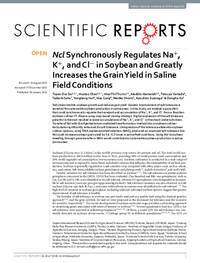Ncl Synchronously Regulates Na+, K+, and Cl− in Soybean and Greatly Increases the Grain Yield in Saline Field Conditions

Authors:
Salt stress inhibits soybean growth and reduces gain yield. Genetic improvement of salt tolerance is essential for sustainable soybean production in saline areas. In this study, we isolated a gene (Ncl) that could synchronously regulate the transport and accumulation of Na+, K+, and Cl-from a Brazilian soybean cultivar FT-Abyara using map-based cloning strategy. Higher expression of the salt tolerance gene Ncl in the root resulted in lower accumulations of Na+, K+, and Cl-in the shoot under salt stress. Transfer of Ncl with the Agrobacterium-mediated transformation method into a soybean cultivar Kariyutaka significantly enhanced its salt tolerance. Introgression of the tolerance allele into soybean cultivar Jackson, using DNA marker-assisted selection (MAS), produced an improved salt tolerance line. Ncl could increase soybean grain yield by 3.6-5.5 times in saline field conditions. Using Ncl in soybean breeding through gene transfer or MAS would contribute to sustainable soybean production in salineprone areas.
